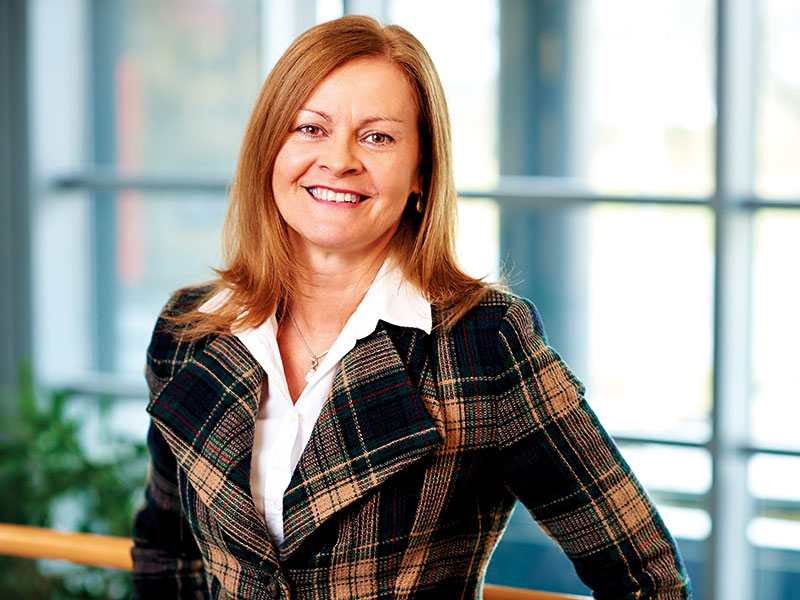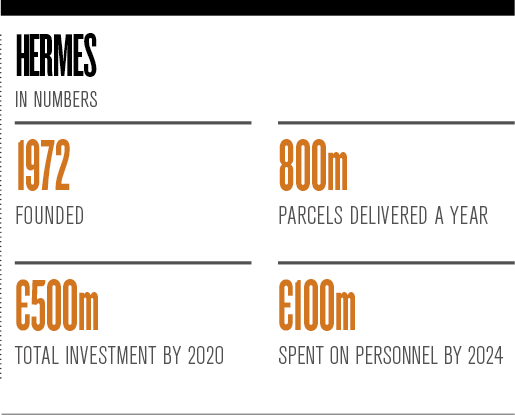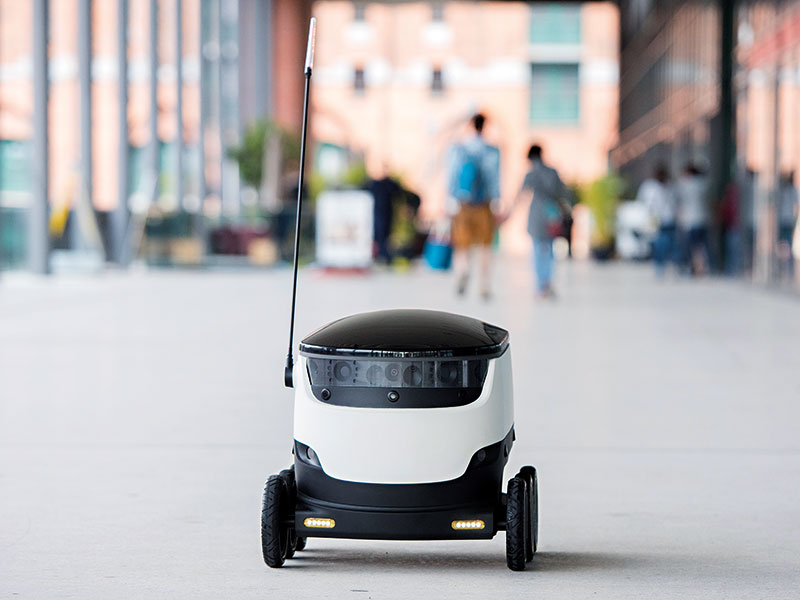
The delivery and logistics industry can be an unforgiving one. Millions of parcels can be delivered on time and without incident, but it only takes one example of poor service to tarnish a company’s reputation. Websites and local newspapers are often awash with stories of birthdays and Christmases ruined by deliveries gone wrong.
Mistakes are part and parcel of the delivery trade, but some couriers appear more committed to reducing instances of poor service than others. Since its founding in 1972, Hermes has acquired plenty of knowledge regarding what works well and what doesn’t in the rapidly changing logistics industry. One of the reasons the firm has been able to adapt to new technologies and shifting consumer trends is its excellent staff – not least of all, Hermes Europe CEO Carole Walker.
Walker has been with Hermes’ parent company, the Otto Group, for more than 30 years, starting out in change management roles on behalf of retail business Grattan, before becoming CEO of Hermes UK and then of Hermes Europe in 2017. With experience working in customer service, warehouses and distribution centres, Walker has covered the main operational areas associated with the logistics and delivery sectors. But she remains open to learning new things.
Walker has championed digital innovation at Hermes Europe, with smart route planning proving to be particularly effective
The delivery industry has experienced immense disruption in the past decade, with the rise of e-commerce firms, low-emission vehicles and data analytics all having an impact. Under Walker, however, Hermes Europe has navigated these challenges while still posting impressive growth figures. With new competitors emerging all the time, her stewardship will be needed more than ever in the coming years to ensure her company stays on the right track.
The full package
One of the biggest challenges Walker has faced at Hermes Europe is the fact that consumer values are changing when it comes to delivery. A 2018 survey of consumers found that 94 percent of respondents were more likely to make an online purchase if free delivery was offered but, equally, 40 percent said they would pay if it meant that their package would arrive the next day. Juggling these conflicting demands puts logistics firms such as Hermes Europe in a difficult position.
“As soon as retailers started offering free delivery, consumers no longer [associated] any value with the physical delivery of the parcel to their home,” Walker explained to European CEO. “And when you think about the value chain that’s involved in delivering parcels to consumers, there is a substantial, infrastructure-heavy network that goes into that – and therefore a cost. I think this is one of the major conundrums facing the industry. How do we continue to satisfy customers that want free deliveries, when there are just as many that want it fast – next-day or even the same day?”
Another test facing Hermes is how to cope with increased demand. Online shopping has caused a boom in parcel deliveries all over the world, and it is hardly surprising that couriers are struggling to keep pace. In 2018, Amazon called on entrepreneurs to start new delivery companies to cope with the added demand. Walker said Hermes Europe is “typically seeing between 15 and 20 percent annual growth for its products and services”. While this is impressive, it is not easy to maintain.
By 2020, Hermes plans to invest approximately €500m across all its business units – an amount that Walker understands will be necessary for Hermes Europe to continue meeting its customers’ high expectations. “The investment is hugely important,” Walker explained. “It’s a substantial increase on the previous three years and will be necessary as e-commerce is set to grow hugely in the coming years. We need to invest in capacity, hubs, depots and the final mile, and we need to continually deliver a better customer experience. We are redesigning processes and offering customers more choice – these are all areas that are critical in order to become the carrier of choice for consumers.”
The extra financial injection that Hermes Europe has planned for the near future will not only benefit the company’s customers. Over the next five years, Hermes Germany will invest €100m in personnel costs, with delivery staff at Hermes and its service partners set for a wage increase. With her many years of experience managing teams large and small, Walker understands that Hermes Europe must look after its employees if they are to look after customers’ packages in turn.

Outside the box
Like most industries, the logistics and delivery sectors have faced disruption from technological developments in recent years. As online shopping has become more popular, customers have begun demanding faster, more convenient delivery services. Investing in new technologies is the best way to achieve this.
“As we’ve embraced digital, customers’ time horizons have become more instant,” Walker said. “The consumer is now in control and they expect a wide range of service offers. For example, they expect their suppliers to respect the fact that they can change their minds halfway through a delivery process.”
To meet these new customer demands, Walker has championed digital innovation at the company, with smart route planning proving to be particularly effective. The new software was introduced in Germany last year and can automatically adjust to any changes that occur during the course of the delivery route. The new innovation should provide significant productivity benefits and enable drivers to give customers a more accurate estimate for delivery times.
“With the implementation of smart route planning, we are already seeing a number of improvements,” Walker said. “We are seeking to get real-time traffic data into our routing, [so] that we can make our couriers as efficient as possible. Following the initial tests we have carried out, we’ve witnessed a 34 percent reduction in customer complaints.
Drivers are also feeling the benefits. It now takes less time to train a new driver, it is easier to be a good driver and therefore easier to promote quality and loyalty. There is a real shortage of drivers, so making it easier to be a great driver is a really important aspect of what we’re using our innovation for.”
Hermes is leading the way in terms of its tests of emissions-free deliveries, whether they involve electric vehicles or cargo bikes
These new technologies do come with risks, however. Hermes Europe is no longer simply a delivery firm – it is also a data storage one. In order to build the models that will enable it to improve its customer service, the storage, transportation and management of customer data has become increasingly important.
A number of high-profile businesses have struggled to maintain their cyberdefences against attack – whether it’s from disgruntled employees or external actors. Walker is committed to making sure Hermes Europe does not join them. By making customer centricity a primary aspect of the business, she ensures that securing data is too.
Far and wide
Another reason technology is required more than ever at Hermes is the complexity of its parcel delivery network. To facilitate cross-border deliveries, the company has a number of strategic partners and a recently created business unit, Hermes International, to bring together all of the organisation’s international activities in one place. Even so, integrating different partner systems and keeping track of changing regulations can be challenging across borders.
“We have a whole network of partners, systems and services, and we position ourselves as a truly global service,” Walker told European CEO. “We have a sister company called BorderGuru, a start-up that began around four years ago, that provides software that can calculate the tax and customs duty needed for an individual parcel. The system allows customers to calculate their fees within the online checkout and pay it as a single transaction there and then, avoiding any delays.”
All these journeys, whether long or short, have an environmental effect, but Hermes Europe is fighting hard to reduce its impact. The delivery firm has invested heavily in its parcel shop network – it now has the largest in Europe – which has been shown to result in much lower carbon dioxide emissions when compared with home delivery. A number of other initiatives have also been employed.
“In terms of electric vehicles, we have many different concepts and pilots that we are running,” Walker said. “The largest is our strategic partnership with Daimler – we have committed to putting up to 1,500 electric vehicles into all German cities in the coming years. We are also testing the new Mercedes eActros, which is a 25-tonne long-distance [electric] truck. And at the other end of the scale, we have our e-cargo bike tests in Berlin.”
Currently, Hermes is leading the way in terms of its tests of emissions-free deliveries, whether they involve electric vehicles or cargo bikes. The Otto Group has a very high degree of sustainability entrenched within its DNA, and Walker is making sure this is shared with Hermes Europe.

Leader of the pack
With e-commerce set to expand to include up to 70 percent of retail sales within the next two to three decades, Hermes Europe is expecting double-digit growth. Under Walker, the company has its own innovation radar – involving artificial intelligence, automated solutions and robotics – and the company certainly needs to be focused on the future. The industry is only going to become more competitive.
Amazon has already launched its own delivery service, Shipping with Amazon, in selected markets, and other hi-tech firms including Google are testing their own services. Making sure Hermes remains competitive in this increasingly congested field is vital if the company is to retain its good reputation among customers and clients.
“More and more CEOs are willing to talk to their service providers about distribution, as they see this as a means to compete,” Walker said. “According to recent research, 60 percent of customers have bought goods from one e-commerce provider over another because they feel their delivery options are more convenient for their needs. More than half say deliveries always define whom they shop with. So these are fundamental parts, not only of the delivery experience but also the retail experience.”
As a group, Hermes already delivers close to 800 million parcels a year, but the growth of e-commerce and the logistics and delivery market means this figure is only likely to go in one direction. This will provide challenges, but ones that Walker is already relishing. Under her stewardship, Hermes Europe will continue to invest in infrastructure, technology and customer experience to grow at least in line with the market.
No matter how much positive customer feedback Hermes Europe receives, Walker’s message to her team is always the same: “You’re only as good as the last parcel you delivered.” It’s an ethos that insures against complacency. Even after more than 30 years in the industry, Walker refuses to take anything for granted.

